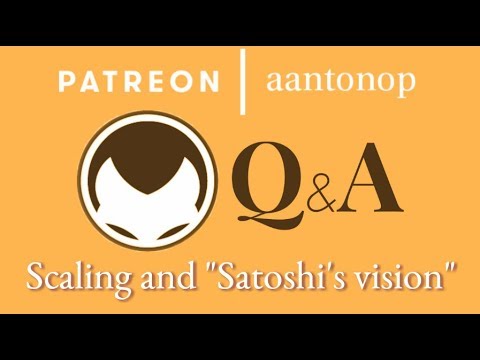How big will the Bitcoin blockchain get? How will optimisations that conserve space affect growth, while keeping full nodes affordable to run? Why should we add second layers for microtransactions instead of moving to altcoins? What design trade-offs will we make regarding scalability, decentralisation, privacy, and smart contracts? Is “Satoshi’s vision” outdated and an appeal to authority?
These questions are from MOOC 9.6 and 9.7 sessions, which took place on March 23rd and March 30th 2018 respectively. Andreas is a teaching fellow with the University of Nicosia. The first course in their Master of Science in Digital Currency degree, DFIN-511: Introduction to Digital Currencies, is offered for free as an open enrollment MOOC course to anyone interested in learning about the fundamental principles.
If you want early-access to talks and a chance to participate in the monthly live Q&As with Andreas, become a patron: https://www.patreon.com/aantonop
RELATED:
Measuring Success: Price or Principle – https://youtu.be/mPMsbgWl9p4
Decentralised Globalisation – https://youtu.be/QoiR4aNbTOw
Investing in Education instead of Speculation – https://youtu.be/6uXAbJQoZlE
Beyond Price: Bitcoin’s Impact on the Future – https://youtu.be/rvwVbRQ5Ysc
The Lion and the Shark: Divergent Evolution in Cryptocurrency – https://youtu.be/d0x6CtD8iq4
Wallet design and mass adoption – https://youtu.be/WbZX6BDZJHc
Mass adoption and peer-to-peer commerce – https://youtu.be/n9qIAEFS-Qs
Scaling strategies and adoption – https://youtu.be/dML1a_Ek9Kw
Lightning Network scaling – https://youtu.be/4KiWkwo48k0
Layered scaling and privacy – https://youtu.be/4w-bjUhpf_Q
Scaling complex systems – https://youtu.be/dm9m1oQr6Ks
Scaling, trust, and trade-offs – https://youtu.be/vCxmHwqyJWU
Scaling is a moving target – https://youtu.be/pT9kJq_Ogrk
Price volatility and store of value – https://youtu.be/wzzZT95ijTo
Why I earn bitcoin instead of buying – https://youtu.be/Ci7TyD8jETY
Job opportunities with cryptocurrencies – https://youtu.be/89_p4pDlQtI
Inspiring cryptocurrency projects – https://youtu.be/WW8norCKUbE
From barter to abstract money – https://youtu.be/KYsppZoHguQ
Crossing the chasm of theoretical vs. real need – https://youtu.be/yIR0OBEAaUE
Remittances and smuggling in Venezuela – https://youtu.be/RRXecXfWARw
How long until mainstream adption? – https://youtu.be/y3cKBDBabtA
What is the biggest adoption hurdle? – https://youtu.be/jHgyHF3F2TI
Bitcoin as everyday currency – https://youtu.be/xYvvSV4mjH0
Hyperbitcoinization – https://youtu.be/AB5MU5fXKfo
Andreas M. Antonopoulos is a technologist and serial entrepreneur who has become one of the most well-known and respected figures in bitcoin.
Follow on Twitter: @aantonop https://twitter.com/aantonop
Website: https://antonopoulos.com/
He is the author of two books: “Mastering Bitcoin,” published by O’Reilly Media and considered the best technical guide to bitcoin; “The Internet of Money,” a book about why bitcoin matters.
THE INTERNET OF MONEY, v1: https://www.amazon.co.uk/Internet-Money-collection-Andreas-Antonopoulos/dp/1537000454/ref=asap_bc?ie=UTF8
[NEW] THE INTERNET OF MONEY, v2: https://www.amazon.com/Internet-Money-Andreas-M-Antonopoulos/dp/194791006X/ref=asap_bc?ie=UTF8
MASTERING BITCOIN: https://www.amazon.co.uk/Mastering-Bitcoin-Unlocking-Digital-Cryptocurrencies/dp/1449374042
[NEW] MASTERING BITCOIN, 2nd Edition: https://www.amazon.com/Mastering-Bitcoin-Programming-Open-Blockchain/dp/1491954388
Translations of MASTERING BITCOIN: https://bitcoinbook.info/translations-of-mastering-bitcoin/
Subscribe to the channel to learn more about Bitcoin & open blockchains!
Music: “Unbounded” by Orfan (https://www.facebook.com/Orfan/)
Outro Graphics: Phneep (http://www.phneep.com/)
Outro Art: Rock Barcellos (http://www.rockincomics.com.br/)
source











Does having more nodes increase transaction speed?
bcashacrash
Wow, awesome!
This is just absolutely wrong. You can read what Satoshi said yourself rather than just accepting that "Satoshi didn't expect multi-core/GPUs/pools/ASICs/covert boost" etc from a few out of context quotes. He 100% knew the direction the network would go in terms of specialization and consolidation. He said so many times, both early on and late before stopped having an official presence in the community.
The problem is blockstream.
Hi Andreas, you talk about the trade off between performance and security. I'm curious what your opinion is regarding Hashgraph because they claim to have broken that trade off.
I've read your book (The internet of money: volume 1) and did a school literature study on the subject of Bitcoin scaling, got an 87 out of 100 on it. Could've been higher if I had an interview with a blockchain expert, but I was on a tight schedule. In theory, would you be up for an interview with a student in the future?
No offence but could you back away from the camera lens a little bit. It's not how you look, it's just feels like you are right there within spitting distance, if you know what I mean. 🙂
Kudos – succient and insightful
Please debate Roger Ver
Excellent explanation, thank you Andreas! ?
THE WISEST MAN ALIVE
Satoshi is not a person. Satoshi is a time travelling artificial intelligence. it's been proven unequivocally.
Thanks for share your knows! Great content
Antonopoulos repeats himself when it comes to scalability vs decentalisation. – It is an absolut riddel to me how he, as a long term ambassador for Bitcoin in generell, has not a clear point of view when it comes to the meaning of decentralisation.
It's not rocket science to understand the simplest argument against this. First of all every US citizen is dependent on broadband internet mostly AT&T and with lower market share Verizon or Telecom. It should be easy to understand that the so called "decentralised small block miners" could be easily switched off by AT&T etc. if the deep state forces to do so.
But would it so easy to disconnect a proper datacenter with high available connectivity to big intercontinental tiers? It would be – but the damage would be that the US would look imbecile and highly unattractive for future investors.
A well connected data-center with diverse top tier intercontinental broadband connections does much more for real 'decentralisation' than the silly idea that everyone should be a miner to prevent centralisation.
agreed trade off, only problem is currently the trade of is so heavy on decentralization, that bitcoin has to keep doubling in value with each halving all the way to 2140, to sustain current fees.
surely the power of halving or doubling is lost on most people, ie just folding a piece of metal double 20 times gets you to over 1 million layers ie the way samurai swords were made
any market saturates at some point of time, price is derived from demand
decentralization is a scale surely a slight shift allowing the network to expand enough to just get enough txn to cover the block reward.
Which we know is also using the power of halving.
acceptable fee per transaction should be the goal. as that is the metric that determines if all can use it even if just to open channels, high fees exclude most of the world, Acceptable fees guarantee the survival of bitcoin.
if we know this has to happen at some point in time why not segwit 2x which over 90% signaled for.
clearly the forced small block is looking more and more a ploy as inventive to on-board users on LN which in reality can only work if more centralized
so we will deter decentralization with centralization
wait what ?
Andreas should be invited by US regulators to explain to them what bitcoin is. Like he did for Canada year ago.
You always put me at ease for my support of Bitcoin. Thank you Andreas.
Satoshi Nakamoto is a pseudonym
Satoshi Nakamoto and cypherpunk Hal Finney worked on creating BTC day and night for DECENTRALIZATION not centralized
bcash shills love centralization. Well, Ver, Wright, Falkvinge, Wu's sock-puppets. No one actually uses bcash.
Thanks Andreas. Virtuously patiently explained, again.
I am not very patient: If people that have been in crypto for some time, haven't gotten it by now, I wonder if Bitcoin is for them.
Sorry, not on patreon so I hope Andreas or someone else notices this question: what happens if illegal data gets added to the block chain? Does possessing it become illegal. I would be more surprised if this hadn't already happened to be honest.
Excellent logo ?
Any views on what Elastos is trying to do?
Where do you pull your questions from? Ethereum is getting nuts…hardly usable. Follow me on twitter @therealzambino
Bitcoin is on the right track! The lightning network capacity will grow exponentially like Bitcoin did in its yearly years.
The day I start disagreeing with Andreas is the day I get out of Bitcoin. There isn't a more fair minded person in the crypto world.
Thank you so much for another video. I learned a lot from your videos.
I have a request. Can you please explain the vulnerabilities under the section Smart Contracts in Ethereum Book. I’m basically new to programming.
Keep up the good work and stay healthy.